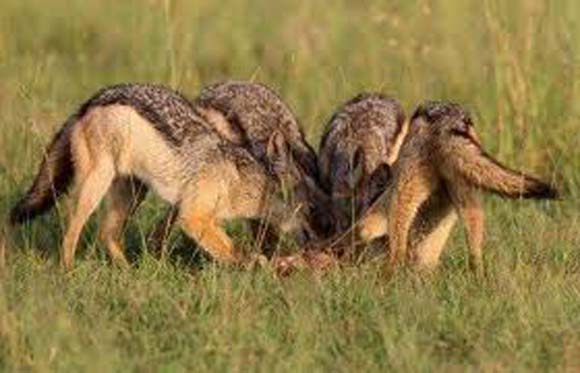
Biblical Beasts: Jackal
12.16k
 For millennia the jackal has played a less than wholesome part in the mythology and literature of the east, near east and Africa. Varying species and subspecies of jackal make this a hard animal to portray accurately, and indeed, this is just the case we face in biblical descriptions. There is, to date, much confusion over when exactly a jackal is being referred to in the bible, particularly given that European translations often substituted instead that much more familiar animal, the fox. It would seem there are three possibilities in Hebrew for the jackal, none exclusive; shû’ãl, ‘the digger’; ‘íyyîm, ‘the howlers’; and tãn, ‘the stretcher’. Endearing titles are they not?
For millennia the jackal has played a less than wholesome part in the mythology and literature of the east, near east and Africa. Varying species and subspecies of jackal make this a hard animal to portray accurately, and indeed, this is just the case we face in biblical descriptions. There is, to date, much confusion over when exactly a jackal is being referred to in the bible, particularly given that European translations often substituted instead that much more familiar animal, the fox. It would seem there are three possibilities in Hebrew for the jackal, none exclusive; shû’ãl, ‘the digger’; ‘íyyîm, ‘the howlers’; and tãn, ‘the stretcher’. Endearing titles are they not?So why does the jackal get such a bad press? Well, the wily and cunning nature of the fox is equally applicable to the jackal, indeed the chief difference seems to be that the jackal is a more social animal. It conceals itself by day and issues forth at night, in pairs or larger packs, to prey upon the weak or defenceless creatures it encounters, or to scavenge among the refuse or crops of mankind. The jackal will eat just about anything, but only fight that which it can easily overpower. In the ancient world it was renowned for devouring the dead and dying that lay strewn on the battlefield after dark. “They will be given over to the sword and become food for jackals” (Psalm 63:10).
 Spiritually speaking, the jackal represents one whose worldly cunning and indifference to the plight of others, is salient. The jackal waits, and watches, and when the time is opportune and the risk slight, he pounces; his aim is survival – at any cost. Understandable for a beast of the field, but for mankind these are not honourable traits. The jackal therefore arises time and time again in scripture to represent the cunning and duplicity of men; the selfishness of one who prowls unseen by night and hides by day. One whose deeds are hidden, whose motivations remain secret; one who prefers the wastelands that hide ill deeds, and who refuses to live openly in the light.
Spiritually speaking, the jackal represents one whose worldly cunning and indifference to the plight of others, is salient. The jackal waits, and watches, and when the time is opportune and the risk slight, he pounces; his aim is survival – at any cost. Understandable for a beast of the field, but for mankind these are not honourable traits. The jackal therefore arises time and time again in scripture to represent the cunning and duplicity of men; the selfishness of one who prowls unseen by night and hides by day. One whose deeds are hidden, whose motivations remain secret; one who prefers the wastelands that hide ill deeds, and who refuses to live openly in the light.Well, you can imagine if interviewed a jackal simply saying ‘we have to earn a living somehow’, and quite right. But for us, we should not indulge in cunning or trickery, or band together to prey on the defenceless. We should not strip others of what is rightfully theirs and then seek to hide ourselves away. We should aim that our deeds can be held before others and not seek the cloak of darkness and night. Indeed, remember that; “You are all sons of the light and sons of the day. We do not belong to the night or to the darkness” (1 Thessalonians 5:5).


